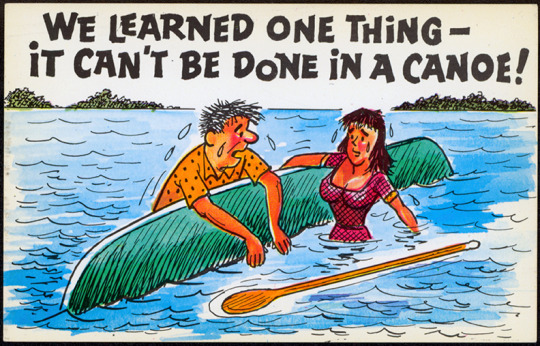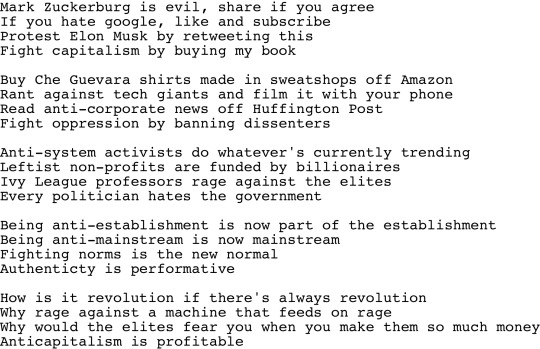#performativity
Text
Feel like we need to talk about the racism within bibliophile communities, the obsession with performing the acts of loving to read and loving books, the consumerism that has infiltrated these circles...
33 notes
·
View notes
Text
i hate how performative a lot of lefty mfs are, they have eat the rich and other shit on their shirts and then when BILLIONAIRES. DIE. IN REAL LIFE IRON LUNG.
they’re like “guys they’re going to drown in their own piss and lack of oxygen don’t make fun of them :(”
like what happened to all that shit you said earlier. idk if you’re too afraid to actually have values that a lot of other people will think are morally abhorrent then don’t pretend to be a part of that movement.
81 notes
·
View notes
Text
Just saw the Barbie movie AGAIN and realized what Allan is.
Allan is weird Ken. He is a Ken who doesn’t necessarily perform his gender, or conform to normal ideas of what a Ken is supposed to be. He is a deviation from the norm. But he isn’t treated that way! Instead, he’s just Ken’s buddy. In a world of Kens and Barbies there are also Allans; people who don’t conform to the system, but aren’t weird because they don’t fit into the system.
Weird Barbie is a Barbie and thus operates within the system, but still defies it. Allan doesn’t operate within the system and thus does not defy it.
Another thing:
Barbie isn’t an ideal, but a projection of ideals. Barbie exists because she follows ideals, just as Weird Barbie exists because she defies ideals. Barbie isn’t the ideal woman - she’s the woman that’s supposed to be the ideal woman. She becomes the ideal woman when she becomes human, because an ideal woman is one that has defies patriarchy by accepting her flaws. That performs her gender for herself.
28 notes
·
View notes
Text
Imagine giving abusers/ex abusers respect on a silver platter for the mere concept that they could've possibly changed, and going easy on them
Only to harshly criticize abuse survivors for "gossiping" and "talking shit" about their abusers because "you're saying words but I'm here to see the ex abuser's actions"
But they are not seeing the abuser's actions, they're only hearing that they may or may not have changed and they've already given them a chance with zero caution and zero doubt which means any red flags are harder to spot (bc your mindset is already trying to focus on pardoning them and being biased)
While demonizing and ostracizing the survivor and not giving them a chance to be heard because "they're just bitter" which means every little flaw and mistake becomes a red flag
And both sides are just saying words (maybe the survivor is backing up the evidence sometimes) but somehow because the abuser is being their usual, egotistical self and passive aggressively doing a smear campaign based on "they don't like me anymore even though I did my best and I've changed" (which shows a very huge lack in self-awareness, emotional intelligence, and empathy), while the abuse survivor is aggressively calling them out, the abuser just seems better to listen to
And I'm tired of the injustice toward abuse survivors. I'm tired that abusers can just say or do whatever and people give them a second chance for pretty much no valid reason, when they're so overly critical of the people who were literally abused (with criticism possibly their whole life)
And people are willing to actually hang out with p3d0s and rxpists and abusers because "they probably changed" but then the people that are hanging out with these p3d0s and rxpists are just so quick to be like "anyways I can't be your friend if you're a shit talker or you're bitter and haven't moved on from trauma yet". Like I'm talking shit but your bestie RXPED SOMEONE.
Like there's clearly some part of you that is not rationalizing things properly and is making you more likely to demonize and attack people for calling a rxpist a rxpist, than demonize the rxpist itself because they can play nice to specifically get on your good side by seeming perfect and never negative (which is a huge sign of manipulation but ok)
But I've found that I just can't save y'all and make y'all see that irrationality, and I shouldn't bother trying.
Because so many people just want me to extend my emotional labor to teaching abusers not to abuse, teaching abuse apologists not to be abuse apologists, and have wanted me to since I was a kid
And the more I rant and rave the more exhausted I get with this idea in mind that I'm ranting to save them and make them understand, and I know it just won't fix anything, not for me and not for y'all
Bc y'all are dead set on letting the abusers play the victim because they know how to play the self-pity game just right to seem more relatable than the angry abuse survivor, and make the angry abuse survivor seem like the big scary mean ones for growing a jagged edge to their moral compass
And y'all have been groomed to empathize more with a bad guy who cries victim than a good guy who is here to *do good* not just to pretend play nice. And I'm over trying to be the therapist that makes you understand how fxked that is.
And no this isn't me saying I'll just move on and be positive and be a good happy lil camper that just loves and tolerates everyone and never vents anymore.
This is me saying that the mental burden of your fxcked up, victim blamey perspective is not my responsibility to fix and I'm not going to rant with the idea that I CAN fix y'all.
Imma rant about how much I can't fucking stand y'all who weaponize ignorance and incompetence, and how much I want y'all to suffer and be as miserable as the rxpists that you ride for their approval, since y'all clearly are going to be on their side either way (until they fxk you over themselves).
And how much I know you're already at that level of misery if you genuinely can't shut the fuck up about abuse survivors for two seconds bc of your insecurity and fears making you project onto them all these things you're scared of being, and how delicious it tastes to me, and how much I crave to see more
Until you're in your 50's saying contradictory shit every two seconds and starting a fight every week like a toxic boomer because you no longer know who you are, what you stand for, and what is based on your authenticity vs your performativity, you just know you want to yell and scream away your insecurities.
And if you don't like it? Cope and seethe.
(bc I might rant a lot but at least I'm ranting for justice and I'm ranting bc y'all are actually being dicks and trying to ruin my mood for no reason- ranting about how survivors are bad bc they wont repress the things that happened to them like you do is very clearly a "I'm miserable and bitter and just won't admit it so I'll project it onto everyone else" thing. The problem is I don't attack good people, and y'all will attack anything that seems even mildly threatening to your insecurities).
#toxic positivity#abuser apologist#victim blaming#victim complex#trauma#emotional abuse#toxic#mental abuse#abuse survivor#but yall the same people that uses narcissist as a buzzword for YOUR exes#but people cant say “hey i was abused by x person” without being toxic#fake supporter#hypocricy#weaponized incompetence#ignorance#performativity#oh but you understand exactly how invalid the “i tried my best and ive changed” argument is when its someone who hurt YOU
16 notes
·
View notes
Text
About to reblog some cute art until I see the artist put an uglyass eye-straining DNI banner right under their drawing.
Doesn’t matter how much I initially liked the art, those DNI banners make me lose all interest.
Not only are they distracting and useless but it also makes me roll my eyes especially hard when I read shit like “usual dni criteria” or “dni racists! dni transphobes!”.
Friend, do you know how many racists and transphobes don’t realize they’re racist and/or transphobic in the first place? People won’t look at your banner and go “aw shucks, I’m too racist for this drawing :(“. And how is “usual dni criteria” any more efficient??
Like, you want to go for a performative Twittercore aesthetic? At that point just use a blocklist or smth, those are more efficient than your eyestrain sparkly banner.
Same with people who write their DNIs in light pastel tones against a white background. Trying to read that shit hurts.
52 notes
·
View notes
Text
Although we can associate theatricality with both Augustus and Nero, I would argue that performativity as it is defined by Judith Butler is an Augustan phenomenon. As Butler states: “Performativity must be understood not as a singular or deliberate ‘act,’ but, rather, as the reiterative and citational practice by which discourse produces the effects that it names." In other words, the performance gains its authority not in and of itself but by its appeal to––and repetition of––precedents that are often nothing more than “sanctioned fantasies, sanctioned imaginaries…elevated as the parameters of realness.”[1] Citationality, then, becomes the locus of authority most often found in “an irrecoverable past.” Whether or not that past existed in any real sense is irrelevant and thus can be created in the present to then cite as law.
The connection between Augustus and performativity can be seen most clearly in the Res Gestae Divi Augusti in which Augustus normalizes his past actions––many of which were untraditional or even illegal––by rewriting them as being exempla of traditional Roman moral conduct. The end result of the Res Gestae, as Melanie Racette-Campbell argues, is that Augustus becomes the definitive model of moral character through an act of citationality that is a ruse, “a dissimulation whereby the prior authority proves to be derived from the contemporary instance of its citation.”
[1] Butler 1993, 89. Cf. 171: “Importantly…there is no power, construed as a subject, that acts, but only, to repeat an earlier phrase, a reiterated acting that is power in its persistence and instability. This is less an ‘act,’ singular and deliberative, than a nexus of power and discourse that repeats or mimes the discursive gestures of power.”
#tagamemnon#Augustus#Octavian#Judith Butler#Performativity#Roman History#Classics#Nero#theatricality
8 notes
·
View notes
Note
You keep saying you don't fetishize transfemininity but quite bluntly the way you understand transness is pretty explicitly fetishistic in the original sense. You see trans womanhood not as an experience of society but as an object, an aesthetic that can simply be put on, a thing to be claimed. Its fucking disgusting and I really hope you can grow up and realize that one day
Trans womanhood is many things: an experience of society, an aesthetic we can adopt, an internal identity. All genders are performative, including trans womanhood; nothing is fetishistic in this view. This is just a queer understanding of gender/trans womanhood.
8 notes
·
View notes
Text
Here is something like a confession which is meant merely to thematize the impossibility of confession: As a young person, I suffered for a long time, and I suspect many people have, from being told, explicitly or implicitly, that what I "am" is a copy, an imitation, a derivative example, a shadow of the real. Compulsory heterosexuality sets itself up as the original, the true, the authentic; the norm that determines the real implies that "being" lesbian is always a kind of miming, a vain effort to participate in the phantasmatic plenitude of naturalized heterosexuality which will always and only fail. And yet, I remember quite distinctly when I first read in Esther Newton's Mother Camp: Female Impersonators in America that drag is not an imitation or a copy of some prior or true gender; according to Newton, drag enacts the very structure of impersonation by which any gender is assumed. [...] Drag constitutes the mundane way in which genders are appropriated, theatricalized, worn, and done; it implies that all gendering is a kind of impersonation and approximation. If this is true, it seems, there is no original or primary gender that drag imitates, but gender is a kind of imitation for which there is no original; in fact, it is a kind of imitation that produces the very notion of the original as an effect and consequence of the imitation itself.
-Judith Butler, "Imitation and Gender Insubordination"
4 notes
·
View notes
Text
By: Brendan O'Neill
Published: May 16, 2023
The chattering classes are mad at Suella Braverman again. What’s she done this time? Brace yourselves: she said racial collective guilt is a bad idea. She said we should not demonise an entire race just because some members of that race did something bad. She said we should never engage in racial shaming. Is there no end to this woman’s nastiness?
I’m old enough to remember when comments like these would have been utterly uncontroversial. When they would have been treated as decent and progressive, in fact. Right-thinking people once railed against the ideology of collective racial punishment, against the ugly idea that the sins of the individual should be visited upon the ethnic group he or she hailed from.
No longer, it seems, judging from the audible intake of breath that greeted Ms Braverman’s insistence that racial shaming has no place in our society. It was at the National Conservatism conference in London that she uttered the incendiary words. White people, she said, should feel no guilt for the crimes committed by white people in the past.
‘White people do not exist in a special state of sin or collective guilt’, she said. ‘Nobody should be blamed for things that happened before they were born’. To my ears, this is as commonsensical as it gets. The idea that white Brits should feel culpable for a vile, cruel practice like slavery that was abolished more than 200 years ago is crazy. It had nothing to do with them.
Braverman’s words will infuriate the identitarian left, however. Because they do buy into the ideology of collective racial guilt. They do think people in the present should self-flagellate for the horrors of the past.
That’s why writers for the Guardian go on about ‘white debt’ – the need for whites to acknowledge and even apologise for British slavery. Why there is pressure on King Charles to say sorry for slavery, despite the fact that he’s never owned a slave. Why articles are published with headlines like ‘How to apologise for slavery’, advising white nations on the right way to repent for historic wrongs.
Under identity politics, white people are expected to beat themselves up for every bad thing done by white people. They’re told to ‘check their white privilege’, to repent for their original sin of racism.
‘White Christians’ must ‘repent of our own prejudices’, as the Archbishop of Canterbury said in the aftermath of the murder of George Floyd in 2020. As if every white – including the little old lady who worships in a CofE village church – bears some kind of collective responsibility for that terrible American crime.
And yet we’re expected to believe that Braverman, with her critique of collective racial guilt, is the bad person, while the modish left, with their belief that all white people should do penance for the wrongs of others, are the good people.
There’s a delicious irony here: the right-on activists who damn Braverman as a racist pox on British society behave in a far more racist way than she ever has. Braverman’s articulate stand against the fashionable rehabilitation of racial shaming is anti-racist in the real meaning of that phrase.
Here’s the twist in this tale. The reason some will be bristling at Braverman’s takedown of white guilt is because they like feeling guilty. Confessing their white privilege makes them feel good. In fact, racial self-loathing, bizarrely, has become a shortcut to the moral high ground for the well-connected.
This is the most important thing to understand about white guilt: it’s a moral boast disguised as racial remorse. In checking their privilege, in expressing regret for the crimes of their forefathers, in apologetically saying ‘As a white person’ before their every utterance, the white middle classes are really advertising their heightened moral sensibilities. They’re making a big, noisy display of their superior levels of racial and social awareness.
It looks like they’re saying, ‘Oh God, I’m white, how awful’, but really they’re saying: ‘I am a virtuous person. I am a special person. Behold my righteousness.’
In a sense, white shame is the new white pride. It’s the means through which well-educated white people demonstrate their social superiority to others, to the less racially aware, to the gammon and the chavs.
It provides them with the tingle of moral superiority in relation to black people, too. There’s a saviour complex to these nauseating theatrics of white guilt. Guilt-performing liberals fancy themselves as the therapists of the black community, arrogantly believing that their mawkish, self-serving displays of historic regret will help to fix those allegedly wounded people.
This is the dirty secret of white guilt. It recreates the unequal relationship between whites and blacks, only in this instance the whites are not oppressing black people but rather are delivering them from their sad, broken state by telling them how sorry they are for old white crimes. It is breathtakingly paternalistic.
Hence the discomfort with Braverman’s stinging aside against white guilt. White guilt is the soapbox from which the new elite signals its specialness and builds up its cultural power. They cannot believe an uppity woman like Suella might take it away from them.
[ Archive: https://archive.is/aErbp ]
==
Reject Original Sin in all its forms.
Especially when it's as obviously performative as Thoughts and Prayers.
#Brendan O'Neill#Suella Braverman#collective guilt#original sin#inherited guilt#moral superiority#virtue signalling#virtue signaling#virtue signal#performativity#white guilt#wokeism#wokeness as religion#cult of woke#woke#luxury beliefs#wokeness#performative virtue#religion is a mental illness
18 notes
·
View notes
Text
instagram
#social media#conflict#performativity#social media is a broken mirror#social media bullying#forced virtue signalling#<<< tags from reel
7 notes
·
View notes
Text

Chapter 11. ‘fucking close to water’: queering the production of the nation by Bruce Erickson (part 1)
“A Canadian is someone who knows how to make love in a canoe” (attributed to Pierre Berton, Raffan 1999b, 225) and “Making love in a canoe is the most Canadian act that two people can do” (45)
Except…actually-- “a Canadian is someone who THINKS he knows how to make love in a canoe” (Ferguson 1997, 158) And it turns out that the person attributed with the quote (Berton) confessed that he did not come up with it.
The canoe is a popular symbol of the Canadian Nation—it’s [been] on currency, sits in the Canadian Embassy in Washington, has been an official gift from the state to foreign dignitaries, and is a part of the multi-million dollar nature tourism industry…(311)
The construction of nationalism requires a narration of national identity that attempts to override the experiences of the national citizens. There will always be a gap between the ideal image of the nation and the actual performance of the nation in the lives of the subjects within the nation, and the dissemination of nationalism occurs in the processes by which that gap is overcome (Bhabha 1994) (311)
The failure of canoe sex within Canadian nationalism suggests a failure that connects sexuality, nature, and race to the future existence of the state. (311)

Biopower (Foucault)-- shows how the construction of identity in modern capitalism is intimately a part of the production of capitalism. National identity is made into an active part of the biopolitical frame of the nation, such that identity becomes another form of labor that is focused upon normalizing and controlling bodies and pleasures. As Foucault reminds us, sexuality stands at the heart of modern power, and its discourse arose along with imperialism and the power of the modern nation-state. (312)
In the modern world, our quest for identity is inherently productive, as late capitalism relies upon the desires of identity to fuel patterns of consumption.
Nation
“Put another way, nations require particular sentiments of attachment, ones that often rest at least in part on the erotic”—Steven Maynard (2001)
Relationship of landscape to the canoe—about hiding the actual form of the relationship with landscape, whether racist colonialism or the production of heterosexuality, to accomplish a fetishizing of the leisured, supposed innocent connection to the land of the new world. (313)
Columbus’s image of the new world was eroticized from the start:
“In 1492, Christopher Columbus blundering about the Caribbean in search of India, wrote home to say that the ancient mariners had erred thinking the earth was round. Rather, he said, it was shaped like a woman’s breast, with a protuberance upon its summit in the unmistakable shape of a nipple—toward which he was slowly sailing (1995, 21) (313)
Europeans have long eroticized the land of America from the moment of its naming and ‘discovery’, yet the common interpretation of this myth as a form of amor patriae hides the heterosexuality implicit within such genealogies.


Performativity: “it is not that heterosexuality is natural and queer denaturalizing; rather heterosexuality is naturalizing, concealing the masquerade of the natural that queer makes manifest” (Prosser 1998, 44) 314
“Performativity must be understood not as a singular or deliberate ‘act’ but, rather, as the reiterative and citational practice by which discourse produces the effects that it names” (Judith Butler 1993, 2) 314
The claim of nationhood=sex in a canoe naturalizes the relationship between the heterosexual image of the nation and the landscape the ‘performance’ takes place
But the failure of the performance (basically no one ACTUALLY has sex in canoes despite the popularity of the quote)…so it can work like a metaphor… it is not the mere ability to canoe or even to have sex in a canoe that embodies the Canadian-ness but rather the reiteration of desire to canoe in Canada—a desire for Canadian canoeing—that embodies the Canadian-ness through the canoe. This desire privileges heterosexual white desire over any different, non-national, or perverse forms of canoeing pleasure. (314)
Sexuality is not about the truth of the matter but about the power of truth (315)
Foucault: power over sexuality relies on cooperation of two regimes; disciplinary power (focused on the control of individual bodies, increasing capabilities to fuel efficiency, aligning mechanic repetitions toward efficiency) and politics focused on controlling populations—Species body (Foucault 1978, 139) (315) (regulatory controls focused on the reproduction of life, the control of birth and death). These regimes produce a mode of biopower (315)
Capitalism would not have been possible without the controlled insertion of bodies into the machinery of production to economic process (Foucault 1978, 141) 315
Sexual identity, as Foucault shows, is made to be part of that production, an argument only proven more and more correct by the increasing power of the “pink” dollar under capitalism (316). (rainbow capitalism)
Then by extending our examination into the realm of colonialism—our understanding of sexual identity and capitalism is tacitly coded by race, and nation. According to Stoler, racism is not “an aberrant, pathological development of state authority n crisis but a fundamental ‘indispensable’ technology of rule—as biopower’s operating mechanism (Stoler 2002, 159) (316)
These same logistics of sexual control (regulation of bodies and species body) occur at the level of race, specifically as part of a national dream. (316) (the american dream=nuclear family)
“Race anchors a distinction in the use of land that justifies the colonial existence of the nation state. It was the productive use the land in North America that allowed European subjects to justify their acquisition of all the fertile and useful land occupied by First Nations peoples. (i.e. John Locke, Gilbert Sproat) 312-317
The 'failure' of the race allowed for the deployment of sexuality to work in tandem with the techniques of state racism such that populations and bodies, of both the colonized and the colonizer, were subject to the regulations of race and sexuality (317)—>The Reservation System; a space established in which to monitor the reproduction (and in many cases the hoped-for death (see Francis 1992 and Bracken 1997) of First Nations communities…census data, marriage regulations, identity papers utilized to fence in populations that stood in the way of the state to the landscape (317)
“A crucial part of the subjugation of …Native peoples was the destruction of their erotic, gender and social life and the imposition of European social and sexual organization…this story of extreme cultural, social, and physical violence lies at the root of the Canadian state” (Kinsman 1996, 92) (317)

#queer ecologies: sex nature politics desire#heteronormativity#canada#sexuality#colonialism#environmental politics#nationalism#residential schools#first nations#queer ecology#queer theory#ecofeminism#critical ecology#canoeing and kayaking#canoeing#racism#performativity#power and control#biopower
3 notes
·
View notes
Text

#poetry#original poem#capitalism#anti capitalism#performativity#performative activism#incelcore#This one doesn’t rhyme but it’s my blog so I’ll do what I want-core
13 notes
·
View notes
Text
i’ve been thinking on this all night, and i can’t wait to show my aunt tomorrow so i can ask her opinion on it.
"Men dream of women. Women dream of themselves being dreamt of. Men look at women. Women watch themselves being looked at. Women constantly meet glances which act like mirrors, reminding them of how they look, or how they should look. Behind every glance is a judgment. Sometimes the glance they meet is their own, reflected back from a real mirror." - John Berger
#womanhood#girlhood#this is obviously SUBJECTIVE#male gaze#performativity#self conscious#self image#femininity#the male gaze
6 notes
·
View notes
Text
My ex (and really any performative goths everywhere) and their obsession with everything black and dark = being morally and aesthetically superior to the point of harassing or hating people for liking simple "pretty" colors like pink and purple, or calling them basic and boring, has unfortunately made me lose all actual interest in the color black, which i have enjoyed since I was 10, and I think pulled me into the "white angelic aesthetic" more, and vibrant greens and blues. (I mean I know not every alt person is like this but being gaslit or judged for a whole year by a shallow, boring person who wears plain black jackets and assumes it to being superior and deep and complex and mysterious can really turn you off from stuff).
I even stopped actively hating the color pink which ive also always disliked since birth, because I'd never want to turn out like my ex who loathes it to the point of having tantrums because it's such a "hideous color", due to the internalized sexism of hating anything feminine because they think it equates to weakness and girliness and basicness and stereotypes *which is weird because pink being a girl stereotype isn't harmful to girls who like it, only harmful to those who don't and are forced to accept it, and boys who like it but can't have anything pink*.
So yeah if anybody ever thought these tactics were actually helpful to inspire people to commit to this one shade (sometimes red on a good day, if its bloody or mixed with black), just know the only people *probably* committing that way are other snooty, insecure gatekeepers who will find a way to gatekeep YOU eventually, or those who are afraid of being rejected due to not fully conforming to a so-called nonconforming group of "eccentric alt rebels that celebrate being different in society", and end up throwing away anything colorful or pretty to be accepted, just for you to complain about how much of a poser or judgmental bitch everyone is these days.
And at this point not everybody WANTS to be emo or goth or some dark alt aesthetic, sometimes people just want to wear black, and genuinely actually hate the goth culture because of this weird need to be like the alt version of mean girls "you can't sit with us" because somebody has a black shirt with pink wristbands🤷
So you're not chasing anybody out at that point, you're just solidifying the concept that they roll better as their own unique, authentic self instead of cutting themself down to be in cookie cutter shape with just an emo fringe on the side because ✨️unique✨️
Maybe if some of them had an actual personality to tend to and manage that wasn't performative for other peoples sights, they wouldn't be so bothered by people only liking the color black *sometimes*. But call people who like pink boring, that's fine too
#performativity#gothic aesthetic#Gatekeepers#superiority complex#harassment#Goths who gatekeep#Basic#basic bitch#femininity#internalized sexism#black aesthetic#black and red#gatekeeper#reverse gatekeeping#Apparently I'm a poser#Rebelling#Goth culture
13 notes
·
View notes
Text
Away
I wish I was someone else,
Myself might even be ok
I'm growing old so quickly,
But I've only lived a handful of days
Two pairs of eyes meet
And I'm forced to look away
It's not my eyes they see,
nor my thoughts they hear
There must be something I can do
He could ask, I can't
It can be done,
Just not by me
So straighten my gaze,
Return to their eyes
And waste another one of his days
3 notes
·
View notes
Quote
Human beings are made up of gaps. We're created by the pauses in sentences, the blank spaces that exist when we think nobody's looking. 'The Americans' understands that every single face we wear is false. Some are just falser than others.
- Emily St. James, The Americans is the best show on TV. So why isn't anybody watching it?
#this is an old article (2015) but i love this quote#tbt to the days when i regularly waited to read emily's reviews#emily st james#the americans#tv#meta#the americans meta#performativity#ths#parallels#insp#mp
16 notes
·
View notes